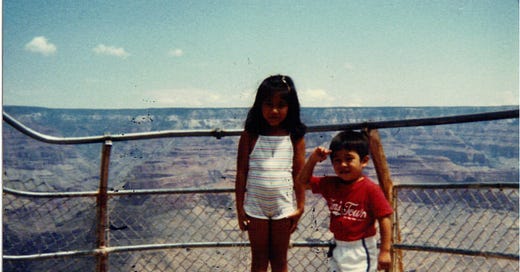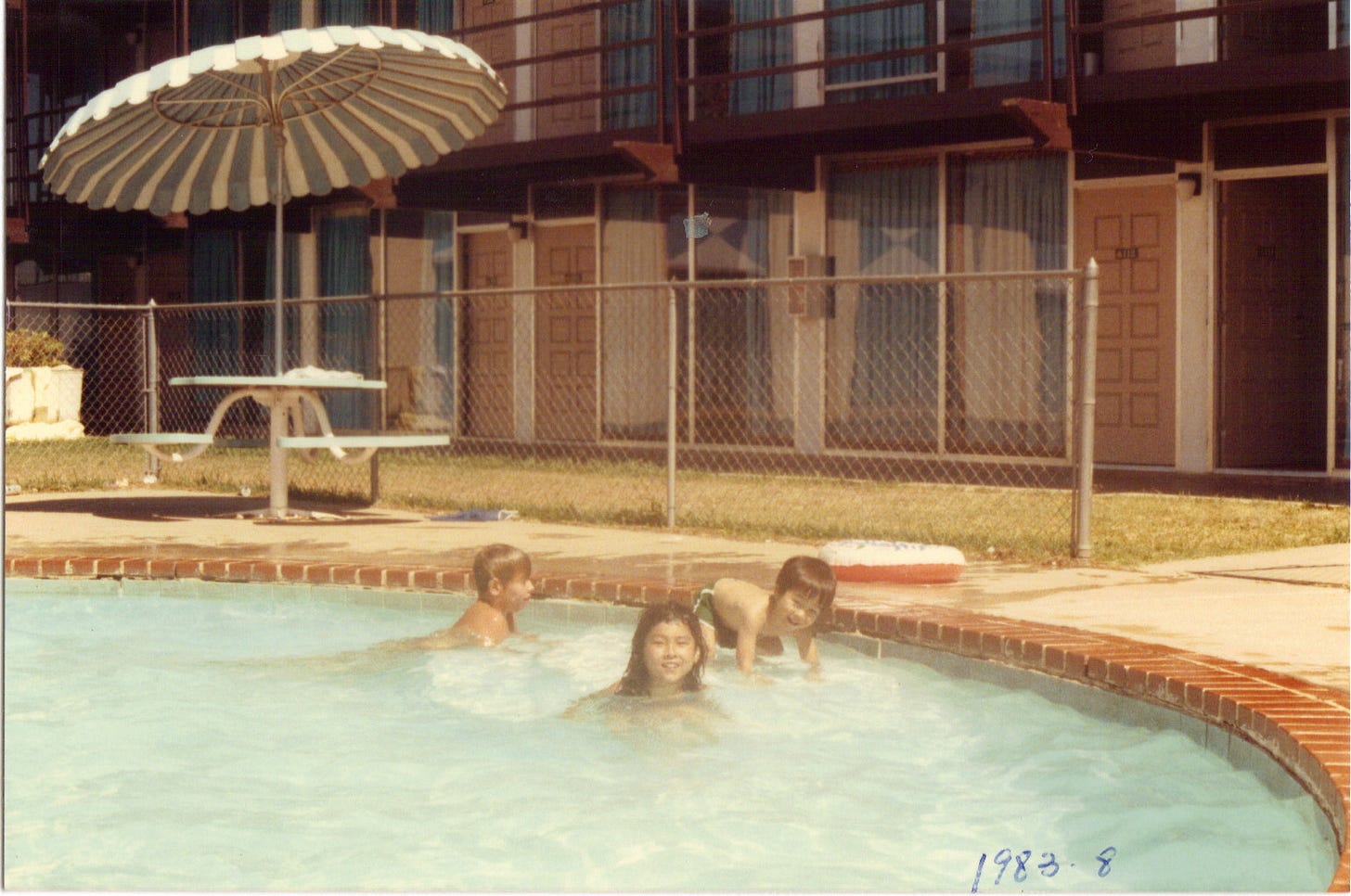When we first immigrated to the U.S., we lived in Texas and my parents were excited to explore this vast country. Whenever we had a school break, they packed our Chevy Malibu station wagon with clothes, sleeping bags, a rice cooker, and a cooler full of banchans and hit the road.
Dad’s best friend lived in San Antonio so our families traveled together. White Sands in New Mexico, the Grand Canyon in Arizona, the Colorado Rockies. We’d drive for hours, days. Sometimes stop in the parking lot of a supermarket to sleep in the car at night to save money.
I can picture Dad poring over the giant AAA atlas on the hood of the car to find the best routes. No GPS, Google Maps, just good old sense of direction and map skills. He’d hand me a Best Western catalog of motels, and it was my job to find ones in the towns where we were visiting. I tried my best to pick ones with a pool.
Most motel rooms were dark and tired; two queen beds with dark covers, a sink against the back wall, and a small bathroom with a toilet and shower/tub combo. We only stayed in the room to sleep or make food (we rarely ate out when we road tripped, too expensive). If it was warm enough, I stayed in the pool for as long as possible.
We didn’t know how to swim but it didn’t matter where we stayed as long as there was a pool.
The first two years in the U.S. were filled to the brim with vacation memories but when we moved to the East Coast, my dad had far less time, and he never took time off for vacation.
Instead, vacation meant going to church-sponsored retreats to the Poconos or a Christian retreat center in New Jersey called Aldersgate where we slept in bunk beds and showered in cobwebbed communal bathrooms.
Our church rented the space during off-seasons in November or February when we couldn’t swim or play much outdoors. As the pastor’s family, we arrived hours before everyone else. Mom would make a huge vat of beef radish soup so people could warm up as they arrived.
Koreans love cooking elaborate meals outdoors. Hot dogs and s'mores will not do. It has to be the full spread: grilled meats, rice, lettuce wraps, rolls of kimbap, soups, and vats of kimchi tightly wrapped in plastic so the juices wouldn’t spill during the drive over. Camp fires didn’t have marshmallows, instead foil-wrapped sweet potatoes nestled in the fire. Then late in the evening before going to sleep, secret stashes of cup ramyuns appeared. We woke up puffy and bloated the next morning.
Summer vacations meant visiting our cousins in suburban Philadelphia. We usually stayed with my aunt and cousins. We slept on the floor and stayed up late playing or watching television while parents talked late into the night in the kitchen. In the morning, we’d follow my uncle to his Tae Kwon Do studio to sweat it out. For lunch, we’d walk over to my aunt’s corner store to eat hoagies and potato chips.
Sometimes, we’d visit another uncle’s wig shop or my grandparents’ apartment in West Philadelphia. We begged our parents for a quarter to use the hot cocoa vending machine in the lobby or follow Grandma to the community garden where she’d pick zucchini, peppers, or cucumbers to make dinner.
The one time my parents took us on a “proper” vacation, we went to Virginia Beach. It was the summer before my senior year of high school. We stayed at a beach front hotel which cost more than my parents could afford.
For a sulky teen, this was torture. Mom goaded me to get into the ocean but I refused to ruin my hair. One day, she wore a bikini to the beach and approached a group of teenage boys boogie boarding if she could give it a try. Cringe. Is there anything more mortifying to a 17 year old girl than this?
To save money, we ate food from home for breakfast, lunch and dinner. After four days, I refused. “Can’t we eat out just once?” The compromise was letting us pick something from the grocery store. I don’t remember what I picked out but we ate in the parking lot sitting on the folded-down back door of the station wagon.
“I hate this trip! I want to go home!” I cried. My parents yelled. Then they argued with each other while passersby stared. This vacation was a bust.
On our last day, we went to King’s Dominion, an amusement park outside of DC. It rained earlier that morning and the seats of the rides were all wet. For most of the day, I walked far behind my parents like a sullen teen pretending she wasn’t there with her family.
I saw a roller coaster that looked exciting but my brother was too short to ride. I convinced my mom to ride with me. She had never rode a roller coaster before, and had she known what was going to happen, she likely would have refused.
As the train sped up and down, I could hear my mom yelling and laughing like a kid. “Wahhhhh! Whoaaaa!!!” I hadn’t heard her have so much fun. For ninety seconds I glimpsed what she might have been like as a teen. When the train stopped she burst out laughing, “I almost peed in my pants!” That is my favorite memory from the trip.
Spring Break is around the corner and I have been carefully planning our trip for months. When we shared the plan with our kids, our son was upset. “Can’t we stay home for one break? I don’t want to go anywhere. I just want to relax at home.” I almost snapped back, “You can stay at home if you’re going to be ungrateful. I never had the opportunity to go to Europe with my parents for Spring Break!” Then I paused and considered what he was saying—he wanted rest, quiet, connection, and freedom to do what he wanted.
Maybe I’m trying too hard to provide what I think our kids should have not what they need? Maybe I’m overcompensating for what I think was lacking in my childhood?
What’s clearer to me now is that my imperfect childhood vacations were simply perfect. Mom and Dad gave me exactly what I needed: time to connect with family and friends, opportunities to have fun and struggle, chances to tough out discomfort and find joy, and lots of free time and space to explore on my own. I guess there was a lot of wisdom in the imperfect vacations of my childhood. Thank you, Mom & Dad.




